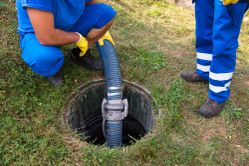
Winter is on its way out. As the weather begins to warm up, it’s time to complete your spring household and garden chores so that they’re out of the way. You can start the new season with everything ready and working. Septic tank maintenance is as essential as checking your roof and preparing your landscaping, but homeowners often fail to put it on their to-do list. If you’ve not yet considered your spring maintenance plan, now’s the time to do so.
Why is Septic Tank Maintenance Important?
If you want a smooth-running septic tank, you need to get your spring maintenance underway now. Transitioning from winter to spring often brings septic tank issues due to the changes in the weather. The ground is already cold and wet from winter. When spring comes along and brings with it large amounts of rain and showers. Because of this, the water table levels rise, which floods or overworks the septic tank system. Preparing for spring allows you to weather out any storm and prevents septic issues from affecting your home.
How Should You Prepare Your Septic Tank for Spring?
Reduce Water Usage
Cutting back your water usage in the run-up to spring, known as water conservation, takes the pressure off your septic tank system. You can conserve water by turning off the faucet while brushing your teeth, using washing machines and dishwashers only when they’re full, and running showers for less than 10 minutes. If you continue using less water throughout the spring months, you’re less likely to flood the system if there’s a massive storm.
Pump Your Tank
 If you don’t pump your tank during the winter, it’s vital you schedule septic tank maintenance in early spring. The fuller the tank, the harder it has to work. A full tank can’t handle the extra stress caused by rainstorms and will overflow, resulting in drainage blocks or causing sewage to leak into your backyard and home. By pumping your tank, you bring the water levels down, allowing it to cope with excessive rainfall.
If you don’t pump your tank during the winter, it’s vital you schedule septic tank maintenance in early spring. The fuller the tank, the harder it has to work. A full tank can’t handle the extra stress caused by rainstorms and will overflow, resulting in drainage blocks or causing sewage to leak into your backyard and home. By pumping your tank, you bring the water levels down, allowing it to cope with excessive rainfall.
Check Your Tank Filter
All household wastewater flows into a septic tank. Solids sink to the bottom and become sludge, oils and fats rise to the top, and watery “effluent” waste filters out into a leach field. A filter catches last solids that didn’t sink inside the tank, preventing them from entering the leach field. During winter, your filter comes under pressure from holiday stress and winter storms. If the filter becomes blocked, it backs up the whole system. As part of your spring septic tank maintenance, check the filter and make sure it’s clear of debris.
Wright’s Septic Service in Tomah, WI, are the team you need to call for all of your septic tank maintenance tasks. For over 50 years, they’ve provided septic solutions to the residents of Monroe County. Their knowledgeable team approaches every job with professionalism, and they take pride in delivering expert maintenance and cleaning services at affordable prices. Call them today at (608) 372-3615 to schedule your septic tank care appointment.
About the Business


